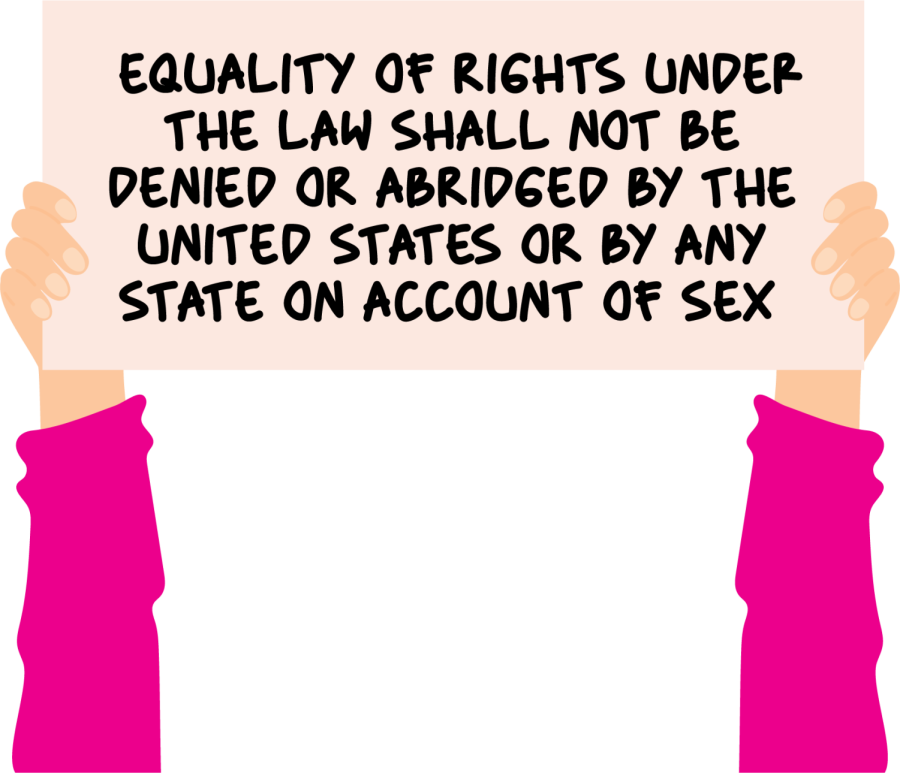ERASE FEAR: Bring Back The Equal Rights Amendment
I am perpetually in awe of the women who paved the way for me and for all American women. Whether it be Elizabeth Cady Stanton and Lucretia Mott, who fought for my right to vote, or Mary Bruemmer who was the first woman on the University News staff, I am forever indebted to these women and their legacies. However, it is Alice Paul’s work, the Equal Rights Amendment (ERA), that we must finish for her now. The ratification period for states from its original passing in the House and Senate has long elapsed, and as a result, the amendment should be reintroduced so we can ratify it correctly.
The ERA was originally introduced to Congress in December 1923 by Alice Paul and Crystal Eastman. The feminist movement garnered support throughout the 60s and Rep. Martha Griffiths brought it back before the House in 1971. It was twice approved in Congress by March of 1972. Within the following seven years, 38 states needed to ratify it. By 1977, 35 states had ratified the amendment. However, during that time, Phyllis Schlafly took matters into her own hands, stoking the fears of conservative women that they might be drafted or lose alimony. This influence caused five states to revoke their ratification. Following this period, President Carter extended the deadline for ratification, but no states moved to ratify during that time. In the 2010s, three states showed enough interest in the amendment to ratify it far past any deadline. Now, lawsuits are occurring regarding the revocation of ratification and late ratification proceedings. The next step would be to reintroduce the ERA in a new era of feminism and political action.
When I first saw the ERA, I thought of the Fourteenth Amendment, which I had thought meant people of any gender had equal rights. However, that is not the case; in Bradwell v. The State, the Fourteenth Amendment did not protect a woman’s right to practice law. The origin of the Fourteenth Amendment was for former Black male slaves to have equal rights and protections, but not women. We have various acts protecting us still like Title IX, the Pregnancy Discrimination Act and the Equal Pay Act, but additional laws can erase those protections. If there was a definitive statement put into our constitution that directly targets equal rights for all, it would protect the lives of countless individuals.
Some concerns surrounding the ERA are that it would lead to problems with Title IX and other legal protections for women, but the ERA would arguably make Title IX stronger. Some worry that the ERA may erase a judge’s predisposition to grant mothers primary custody, which I see as a good thing because each parent would have to prove themselves as competent caretakers in the eyes of the law. While the ERA will likely lead to women being drafted, women have been successfully serving in all branches of the military for decades now and I don’t see this as a problem. In regards to the Pregnancy Discrimination Act, it would help ensure parental leave for all. A nuance that people associate with the ERA is that it might create a legal basis for genderless bathrooms, locker rooms and dorms, but if everyone implements boundaries, this would not pose a problem. The most valid complaint I have seen is that the ERA might serve as a way for pro-choice organizations to ensure equal, safe access to abortions. However, if you’re afraid that equal rights would ensure people have access to abortions, then you agree that the issue you have is not with the unborn fetus but with the person carrying it.
People who don’t understand the breadth of discrimination that women experience might think this is a symbolic amendment or that it won’t do anything. But, even as a symbol, it would be a powerful statement for Americans and for the rest of the world. I, for one, would have been less terrified during Trump’s election and Amy Coney Barrett’s nomination if I had known that I wouldn’t be stripped of my rights and protections. To know that, “Equality of rights under the law shall not be denied or abridged by the United States or by any state on account of sex” would be a constant comfort.
I know that the historical women who inspired me suffered because they didn’t have their rights protected, but we can do this for future Americans; for the Eleanor Roosevelts and Betty Friedans who could’ve done so much more if they had the rights and privileges that their male counterparts did.
Your donation will support the student journalists of Saint Louis University.





Erica Benson • Apr 2, 2022 at 9:29 am
The ERA is closer to ratification than ever! Ask your U.S. Senators to pass SJ Res 1, the House already removed the deadline and the Senate is only a few votes away. Since Senator Blunt is retiring, he can and should support Constitutional equality for women.
She the scholarship of Dr. Julie Suk
https://msmagazine.com/2021/04/02/equal-rights-amendment-era-constitution-julie-suk/
And the work of the Columbia Law School ERA project. https://gender-sexuality.law.columbia.edu/content/era-project